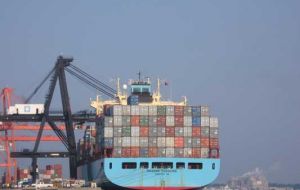MercoPress. South Atlantic News Agency
UN Economic commission forecasts 3.7% growth in Latam and Caribbean this year
 Trade surplus for the region is expected to fall from 1.3% of GDP in 2011 to 0.7% in 2012.
Trade surplus for the region is expected to fall from 1.3% of GDP in 2011 to 0.7% in 2012. The latest ECLAC report, “Macroeconomic report on Latin America and the Caribbean, Jun 2012” shows that activity in the first months of this year has been stronger tan in the second half of 2011 despite considerable global uncertainty and volatility.
The report estimates Latam and Caribbean growth for this year at 3.7% compared to 4.3% in 2011.
The UN Economic Commission on Latin America and the Caribbean predicts that the current European financial crisis, the slowdown in China and the positive but low-level growth in the United States will have differing impacts on the region's countries, depending on the relative size of their export-destination markets and their export structure.
The fastest growing economies for this year, according to ECLAC are as follows: Panama (8%); Haiti (6.0%); Peru (5.7%); Bolivia (5.2%) and Costa Rica (5.0%). Venezuela will also grow 5.0%, while Chile will expand 4.9%, Mexico 4.0%, Argentina 3.5% and Brazil 2.7%.
In the first quarter of this year there was a pause and a partial reversal in the slowdown observed in many countries during 2011. In comparison with the same period of last year, in 2012 the growth rate has risen significantly in Peru, Chile and Venezuela and climbed slightly in Mexico, while there was a break in the slowdown observed in Brazil's economy during 2011.
Growth was slower than in early 2011 for Argentina, Colombia and Guatemala, but only Paraguay posted negative growth during the first quarter of 2012. Available information for Caribbean countries suggests the slow recovery following the 2008-2009 crisis began to be reflected in modest growth rates in 2011, although they have shown an upward trend in the first quarter of 2012.
In the first quarter of 2012, growth was associated with increased internal demand. Services, and particularly trade, remained one of the most buoyant sectors. Private consumption was responsible for the bulk of the rise in regional gross domestic product (GDP), thanks to a rise in employment and wages, the ongoing credit expansion and, in some countries, increased remittances mainly from the United States.
During this period, inflation maintained its downward trend and in April 2012 stood at an annual rate of 5.5%, compared with 6.7% in March and 7% in December 2011.
The drop in prices for the main export commodities triggered a fall in the region's export values in the first quarter of 2012. The year-on-year rate of change for exports went from a maximum of 29.3% in the second quarter of 2011 to 10.4% in the first quarter of 2012. This was partly attributable to the weakening of sales to European countries since early 2011, in the wake of the debt crisis affecting that region and the consequent shrinking of economic activity there.
ECLAC predicts that the relative slowdown in world economic growth expected for 2012 will result in the region's international trade growing more slowly than in 2011. Exports will grow by 6.3% this year, while buoyant internal demand will fuel stronger growth (10.2%) for imports. As a result, the trade surplus will fall from 1.3% of GDP in 2011 to 0.7% in 2012.
The report states that the possibility of a worse external scenario in 2012-2013 should not be ruled out. Were this to happen, it could halt financial inflows to the region and suspend bank credit lines abroad, which would in turn bring about stock market falls and currency depreciation, as well as a reduction in exports and investment.
Likewise although in most countries this is less true than before the 2008-2009 crisis, the region generally has the fiscal room for manoeuvre to implement a countercyclical policy that would contain the immediate effects of the crisis on its economies, except in several Caribbean countries.
The report concludes that, should the external climate worsen, many countries are in a position to take action without affecting the sustainability of public and external finances, thereby moderating the effects on growth. Other countries may require external financial support from regional and multilateral organizations in order to avoid a deepening of unemployment and poverty.




Top Comments
Disclaimer & comment rules-

-

Read all comments“the region generally has the fiscal room for manoeuvre to implement a countercyclical policy that would contain the immediate effects of the crisis on its economies”
Jun 16th, 2012 - 01:44 pm 0Sailing in to the storm in shipshape. Lets hope the storm isn't too long.
Europe, sort them fooking Greeks out!
Europe, sort them fooking Greeks out!
Jun 19th, 2012 - 11:22 am 0+2
Commenting for this story is now closed.
If you have a Facebook account, become a fan and comment on our Facebook Page!